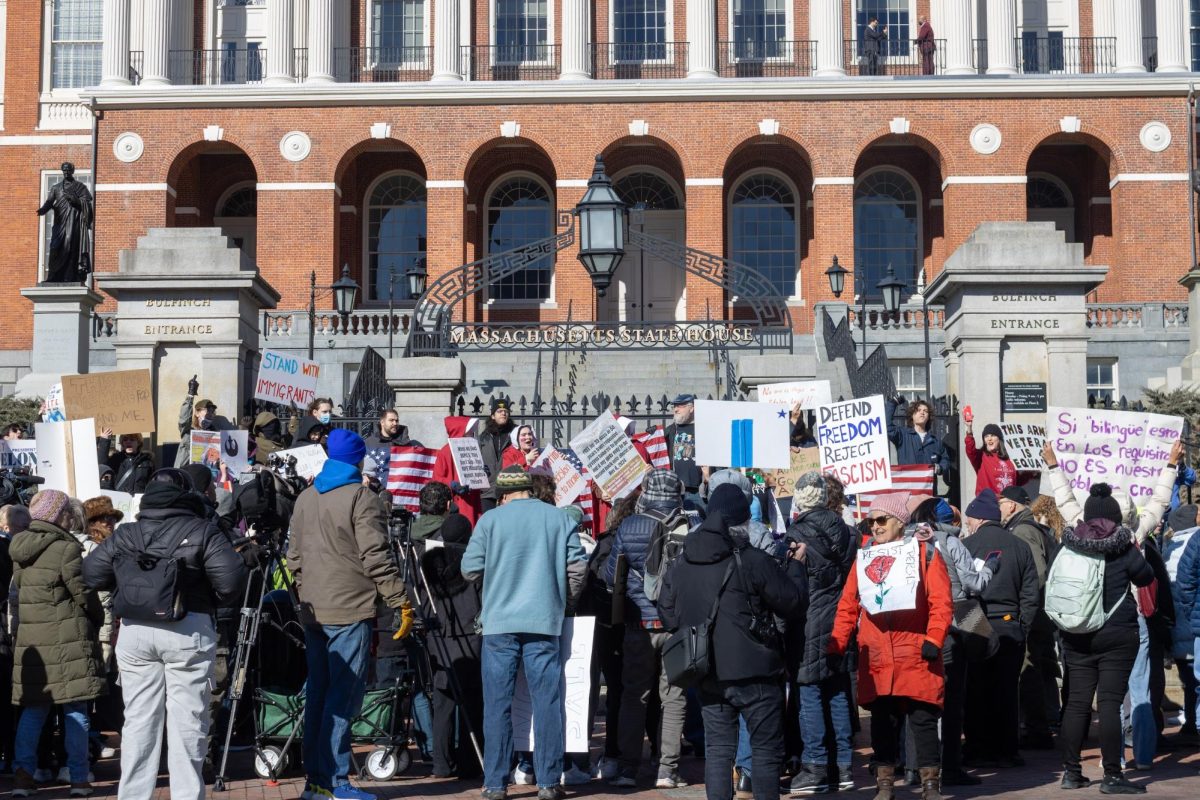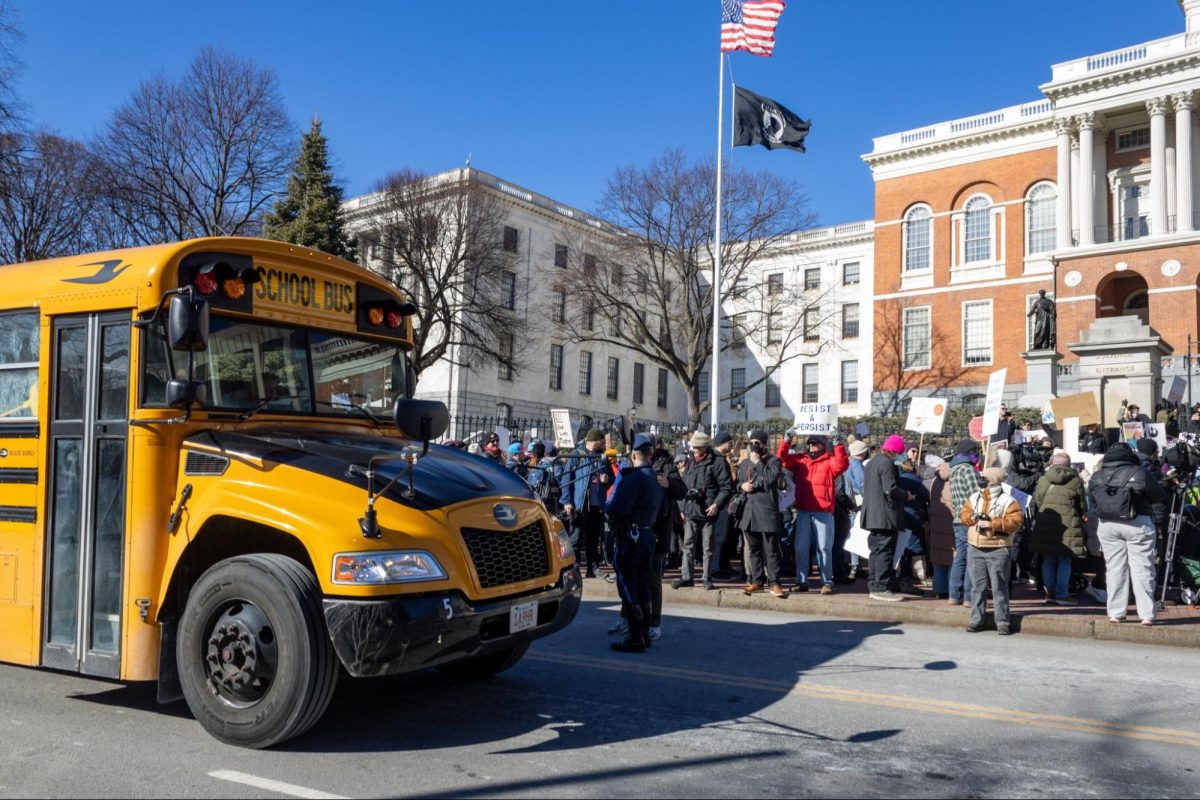Hundreds of demonstrators gathered at the Massachusetts State House, holding signs and joining in chants, Feb. 5 to voice their disapproval of President Donald Trump, Elon Musk and recent executive orders.
The protest was one of a nationwide wave of demonstrations advertised on social media as part of the 50501 movement, referring to a goal of 50 protests held across all 50 states in one day. Similar protests were held in Charleston, West Virginia; Madison, Wisconsin; Sacramento, California and more major cities nationwide.
Though there was no single organizer identified, numerous activist and political organizations were present at the event. One of the most vocal groups was the Revolutionary Communist Party of America, or RevCom, who led chants at the State House’s gates. One RevCom member, Rose Sullivan, said that while the country is divided, people must come together to tackle what she called, “a new form of dictatorship.”
“This is a good beginning, but we need a movement that’s going to take on this whole fascist program,” Sullivan said. “Here, you have some people protesting against the war on immigrants, some people protesting against the war on trans people, protesting for Gaza or for women’s rights, which is great, but we’ve got to come together and beat the whole fascist program.”
Sullivan emphasized that the protest was only the start of a much larger movement.
“It’s going to have to be much larger and broader. We’re going to have to shut the country down like they did in South Korea. If they could do it in South Korea, why can’t we do it here?” Sullivan said, referring to the mass protests in South Korea after the now-impeached president temporarily declared martial law.

Extinction Rebellion, an international environmentalist group that has been protesting in front of the Massachusetts State House for a year and a half to oppose legislatures passing new fossil fuel infrastructure bills, also attended the protest. Stewart Clements, a longtime group member, said making an appearance at the protest was a good opportunity to build community.
“This [event] was a great opportunity for us, as a large nonviolent action group, to participate in a larger protest,” Clements said. “We’re [Extinction Rebellion] a big believer that you can only affect what’s right in front of you. That involves building a community of people you trust, that can go through these dramatic tough times that we’re facing.”
Clements also echoed Sullivan’s statement, describing how the variety of viewpoints at the protest must unite against a common enemy.
“This is a huge community and we share certain values and, like every family, we don’t share all the same values, but we do feel that this is a community that can help each other,” Clements said.

Jennifer Holey, a longtime activist, founder of the group E3: Educated, Empowered and Engaged and U.S. Army veteran, traveled three hours from her home in Berkshire County to attend the protest, which she said was a way of exercising her First Amendment rights.
“That’s the most important thing I defended as a veteran, as an army soldier, is our First Amendment rights and our right to gather and peacefully assemble, and that’s what we did here today,” Holey said.
Holey held a sign reading, “This army veteran is for equality,” which she said she had brought to protests for years, from the 2017 Women’s March to the 2020 Commitment March after George Floyd’s murder and more. She said that every movement is a chance to stand together and resist.
“[The administration] wants us to be quiet. They want to bully us into submission and silence and they want us to just wait for the midterm elections,” Holey said. “It’s way past time to resist. It’s way past time to stand up and they cannot silence us if we all stand together.”
The protest did not go without opposition: Two counter-protesters in “Make America Great Again” hats held up signs with anti-transgender slogans. They were flanked by Massachusetts State Police officers, but one of the counter protesters stepped aside to provide comment to reporters on the scene.
Landon Costigan claimed to represent an “underground conservative group” based in Northampton, he told The Huntington News.
“We decided last week to come out here and we knew there would be a lot of backlash,” Costigan said. “[Massachusetts] is really discriminatory toward anyone who is Republican.”
The interview was interrupted by a protester attempting to physically block reporters from speaking to the counter protesters and talking loudly over the interview. Costigan reacted by calling the individual blocking him from the press a “far-left communist.”
“I’m not saying all Democrats are like this, but it’s people like this that give the Democrat[ic] Party a bad vibe,” Costigan said. “You don’t see Republicans suppressing free speech, you see communists on the far left, like this, who don’t support the First Amendment.”

Costigan repeatedly referenced his sign, which supported a Jan. 20 executive order to legally recognize only two genders. This resulted in the mass censorship and scrubbing of scientific research articles that mention terms relating to gender and more. Many scientists, such as Dr. Alfredo Morabia, the American Journal of Public Health’s editor-in-chief, worry that these censorships violate the First Amendment.
“It sounds incredible that this is compatible with the First Amendment. A constitutional right has been canceled,” Morabia said in a Feb. 3 interview with Reuters. “How can the government decide what words a journal can use to describe a scientific reality? That reality needs to be named.”
Larry Gostin, professor of law at Georgetown University, explained in an email to Inside Medicine that some affected journals were co-written by private and government-employed authors, which is of particular concern regarding the order’s constitutionality.
“If the administration withdraws those articles or forces the lead government author to withdraw, that could affect the free speech rights of private authors,” Gostin said to Inside Medicine. “The president is right on the line of an unconstitutional abridgment of speech.”
The presence of counter-protesters did not dissuade demonstrators like Lexi Spagnardi, a disability justice professional at Massachusetts General Hospital who attended the protest. She said that standing together against the new administration was vital.
“They want us to be scared, so if we’re out here showing up and not hiding, then that sends a message that we’re not just going to let this all happen to us,” Spagnardi said. “It’s a scary time, but we have to try not to be scared.”
Spagnardi acknowledged that while demonstrating might not do much to change these policies, it helped to provide hope.
“At the moment, it feels like we can’t do anything and we’re seeing a lot of things happen every day that just feel really out of our control,” Spagnardi said. “Even though I don’t necessarily know if protesting does anything in the end, it feels good to be with other people who feel similarly. It’s energizing and empowering.”












